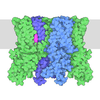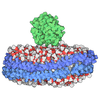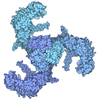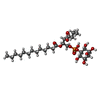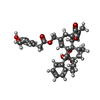[English] 日本語
 Yorodumi
Yorodumi- PDB-7mze: Cryo-EM structure of minimal TRPV1 with 2 bound RTX in opposite p... -
+ Open data
Open data
- Basic information
Basic information
| Entry | Database: PDB / ID: 7mze | ||||||||||||||||||
|---|---|---|---|---|---|---|---|---|---|---|---|---|---|---|---|---|---|---|---|
| Title | Cryo-EM structure of minimal TRPV1 with 2 bound RTX in opposite pockets | ||||||||||||||||||
 Components Components | Transient receptor potential cation channel subfamily V member 1 | ||||||||||||||||||
 Keywords Keywords | TRANSPORT PROTEIN / TRP channel / cryo-EM / nanodisc / stoichiometry | ||||||||||||||||||
| Function / homology |  Function and homology information Function and homology informationnegative regulation of establishment of blood-brain barrier / response to capsazepine / sensory perception of mechanical stimulus / peptide secretion / cellular response to temperature stimulus / smooth muscle contraction involved in micturition / excitatory extracellular ligand-gated monoatomic ion channel activity / temperature-gated ion channel activity / detection of chemical stimulus involved in sensory perception of pain / TRP channels ...negative regulation of establishment of blood-brain barrier / response to capsazepine / sensory perception of mechanical stimulus / peptide secretion / cellular response to temperature stimulus / smooth muscle contraction involved in micturition / excitatory extracellular ligand-gated monoatomic ion channel activity / temperature-gated ion channel activity / detection of chemical stimulus involved in sensory perception of pain / TRP channels / fever generation / urinary bladder smooth muscle contraction / detection of temperature stimulus involved in thermoception / thermoception / cellular response to acidic pH / negative regulation of systemic arterial blood pressure / response to pH / chloride channel regulator activity / dendritic spine membrane / glutamate secretion / monoatomic cation transmembrane transporter activity / ligand-gated monoatomic ion channel activity / negative regulation of heart rate / response to pain / temperature homeostasis / diet induced thermogenesis / cellular response to alkaloid / cellular response to ATP / cellular response to cytokine stimulus / detection of temperature stimulus involved in sensory perception of pain / intracellularly gated calcium channel activity / behavioral response to pain / negative regulation of mitochondrial membrane potential / calcium ion import across plasma membrane / monoatomic cation channel activity / extracellular ligand-gated monoatomic ion channel activity / sensory perception of pain / phosphatidylinositol binding / phosphoprotein binding / microglial cell activation / cellular response to nerve growth factor stimulus / response to peptide hormone / calcium ion transmembrane transport / GABA-ergic synapse / cellular response to growth factor stimulus / lipid metabolic process / calcium channel activity / positive regulation of nitric oxide biosynthetic process / cellular response to tumor necrosis factor / calcium ion transport / transmembrane signaling receptor activity / sensory perception of taste / cellular response to heat / positive regulation of cytosolic calcium ion concentration / response to heat / monoatomic ion transmembrane transport / protein homotetramerization / postsynaptic membrane / calmodulin binding / neuron projection / positive regulation of apoptotic process / external side of plasma membrane / neuronal cell body / dendrite / negative regulation of transcription by RNA polymerase II / ATP binding / metal ion binding / identical protein binding / membrane / plasma membrane Similarity search - Function | ||||||||||||||||||
| Biological species |  | ||||||||||||||||||
| Method | ELECTRON MICROSCOPY / single particle reconstruction / cryo EM / Resolution: 3.42 Å | ||||||||||||||||||
 Authors Authors | Zhang, K. / Julius, D. / Cheng, Y. | ||||||||||||||||||
| Funding support |  France, France,  United States, 5items United States, 5items
| ||||||||||||||||||
 Citation Citation |  Journal: Cell / Year: 2021 Journal: Cell / Year: 2021Title: Structural snapshots of TRPV1 reveal mechanism of polymodal functionality. Authors: Kaihua Zhang / David Julius / Yifan Cheng /  Abstract: Many transient receptor potential (TRP) channels respond to diverse stimuli and conditionally conduct small and large cations. Such functional plasticity is presumably enabled by a uniquely dynamic ...Many transient receptor potential (TRP) channels respond to diverse stimuli and conditionally conduct small and large cations. Such functional plasticity is presumably enabled by a uniquely dynamic ion selectivity filter that is regulated by physiological agents. What is currently missing is a "photo series" of intermediate structural states that directly address this hypothesis and reveal specific mechanisms behind such dynamic channel regulation. Here, we exploit cryoelectron microscopy (cryo-EM) to visualize conformational transitions of the capsaicin receptor, TRPV1, as a model to understand how dynamic transitions of the selectivity filter in response to algogenic agents, including protons, vanilloid agonists, and peptide toxins, permit permeation by small and large organic cations. These structures also reveal mechanisms governing ligand binding substates, as well as allosteric coupling between key sites that are proximal to the selectivity filter and cytoplasmic gate. These insights suggest a general framework for understanding how TRP channels function as polymodal signal integrators. | ||||||||||||||||||
| History |
|
- Structure visualization
Structure visualization
| Movie |
 Movie viewer Movie viewer |
|---|---|
| Structure viewer | Molecule:  Molmil Molmil Jmol/JSmol Jmol/JSmol |
- Downloads & links
Downloads & links
- Download
Download
| PDBx/mmCIF format |  7mze.cif.gz 7mze.cif.gz | 388.6 KB | Display |  PDBx/mmCIF format PDBx/mmCIF format |
|---|---|---|---|---|
| PDB format |  pdb7mze.ent.gz pdb7mze.ent.gz | 317.1 KB | Display |  PDB format PDB format |
| PDBx/mmJSON format |  7mze.json.gz 7mze.json.gz | Tree view |  PDBx/mmJSON format PDBx/mmJSON format | |
| Others |  Other downloads Other downloads |
-Validation report
| Summary document |  7mze_validation.pdf.gz 7mze_validation.pdf.gz | 1.7 MB | Display |  wwPDB validaton report wwPDB validaton report |
|---|---|---|---|---|
| Full document |  7mze_full_validation.pdf.gz 7mze_full_validation.pdf.gz | 1.7 MB | Display | |
| Data in XML |  7mze_validation.xml.gz 7mze_validation.xml.gz | 69.4 KB | Display | |
| Data in CIF |  7mze_validation.cif.gz 7mze_validation.cif.gz | 103.5 KB | Display | |
| Arichive directory |  https://data.pdbj.org/pub/pdb/validation_reports/mz/7mze https://data.pdbj.org/pub/pdb/validation_reports/mz/7mze ftp://data.pdbj.org/pub/pdb/validation_reports/mz/7mze ftp://data.pdbj.org/pub/pdb/validation_reports/mz/7mze | HTTPS FTP |
-Related structure data
| Related structure data |  24091MC  7l2hC  7l2iC  7l2jC  7l2kC  7l2lC  7l2mC  7l2nC  7l2oC  7l2pC  7l2rC  7l2sC  7l2tC  7l2uC  7l2vC  7l2wC  7l2xC  7mz5C  7mz6C  7mz7C  7mz9C  7mzaC  7mzbC  7mzcC  7mzdC M: map data used to model this data C: citing same article ( |
|---|---|
| Similar structure data |
- Links
Links
- Assembly
Assembly
| Deposited unit | 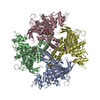
|
|---|---|
| 1 |
|
- Components
Components
| #1: Protein | Mass: 73016.352 Da / Num. of mol.: 4 / Fragment: UNP residues 110-764 Source method: isolated from a genetically manipulated source Source: (gene. exp.)   Homo sapiens (human) / References: UniProt: O35433 Homo sapiens (human) / References: UniProt: O35433#2: Chemical | #3: Chemical | ChemComp-NA / | #4: Chemical | Has ligand of interest | Y | Has protein modification | Y | |
|---|
-Experimental details
-Experiment
| Experiment | Method: ELECTRON MICROSCOPY |
|---|---|
| EM experiment | Aggregation state: PARTICLE / 3D reconstruction method: single particle reconstruction |
- Sample preparation
Sample preparation
| Component | Name: minimal TRPV1 in nanodisc / Type: COMPLEX / Entity ID: #1 / Source: RECOMBINANT |
|---|---|
| Source (natural) | Organism:  |
| Source (recombinant) | Organism:  Homo sapiens (human) Homo sapiens (human) |
| Buffer solution | pH: 6.85 |
| Specimen | Embedding applied: YES / Shadowing applied: NO / Staining applied: NO / Vitrification applied: YES |
| EM embedding | Material: nanodisc |
| Vitrification | Cryogen name: ETHANE |
- Electron microscopy imaging
Electron microscopy imaging
| Experimental equipment |  Model: Titan Krios / Image courtesy: FEI Company |
|---|---|
| Microscopy | Model: FEI TITAN KRIOS |
| Electron gun | Electron source:  FIELD EMISSION GUN / Accelerating voltage: 300 kV / Illumination mode: FLOOD BEAM FIELD EMISSION GUN / Accelerating voltage: 300 kV / Illumination mode: FLOOD BEAM |
| Electron lens | Mode: BRIGHT FIELD |
| Image recording | Electron dose: 66 e/Å2 / Film or detector model: GATAN K3 BIOQUANTUM (6k x 4k) |
- Processing
Processing
| CTF correction | Type: NONE |
|---|---|
| 3D reconstruction | Resolution: 3.42 Å / Resolution method: FSC 0.143 CUT-OFF / Num. of particles: 10873 / Symmetry type: POINT |
 Movie
Movie Controller
Controller



























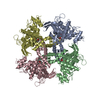
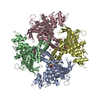
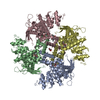
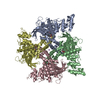
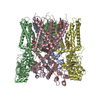
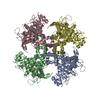
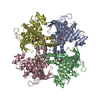
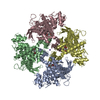
 PDBj
PDBj